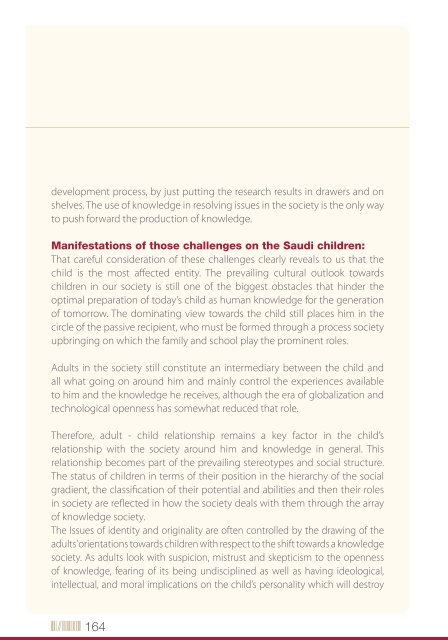General Supervisor
General Supervisor
General Supervisor
Create successful ePaper yourself
Turn your PDF publications into a flip-book with our unique Google optimized e-Paper software.
development process, by just putting the research results in drawers and on<br />
shelves. The use of knowledge in resolving issues in the society is the only way<br />
to push forward the production of knowledge.<br />
Manifestations of those challenges on the Saudi children:<br />
That careful consideration of these challenges clearly reveals to us that the<br />
child is the most affected entity. The prevailing cultural outlook towards<br />
children in our society is still one of the biggest obstacles that hinder the<br />
optimal preparation of today’s child as human knowledge for the generation<br />
of tomorrow. The dominating view towards the child still places him in the<br />
circle of the passive recipient, who must be formed through a process society<br />
upbringing on which the family and school play the prominent roles.<br />
Adults in the society still constitute an intermediary between the child and<br />
all what going on around him and mainly control the experiences available<br />
to him and the knowledge he receives, although the era of globalization and<br />
technological openness has somewhat reduced that role.<br />
Therefore, adult - child relationship remains a key factor in the child’s<br />
relationship with the society around him and knowledge in general. This<br />
relationship becomes part of the prevailing stereotypes and social structure.<br />
The status of children in terms of their position in the hierarchy of the social<br />
gradient, the classification of their potential and abilities and then their roles<br />
in society are reflected in how the society deals with them through the array<br />
of knowledge society.<br />
The Issues of identity and originality are often controlled by the drawing of the<br />
adults’ orientations towards children with respect to the shift towards a knowledge<br />
society. As adults look with suspicion, mistrust and skepticism to the openness<br />
of knowledge, fearing of its being undisciplined as well as having ideological,<br />
intellectual, and moral implications on the child’s personality which will destroy<br />
164<br />
values and principles built by the family and the school. With the passage of time,<br />
the reality of Saudi children in a knowledge society has reached a state closer<br />
to chaos and confusion under such variables of rapid and tremendous changes<br />
which include but not limited to: the huge technological momentum around<br />
them, confinement of the family’s role to reproduction and health care, the role of<br />
the school to transferring scientific information without providing the child with<br />
the skills necessary for self-learning and the conduct of complex thinking, mental<br />
and thinking independence, and the development of methods and research skills.<br />
The society as a whole is engaged in the study of realistic behavior of the child<br />
and his daily problems in an attempt to find solutions to address the phenomena<br />
and the symptoms but it cannot deal with the core issues.<br />
This selective policy of the children role in the society of knowledge, which<br />
is fearful of negative impact of knowledge openness, made the Saudi child a<br />
consuming party which is open to the world through the electronic games for<br />
the sake of which the Saudi society spending billions of riyals every year, and<br />
through the Internet and programs of social networking and all aspects of the<br />
era of globalization.<br />
Failure also lies in the inability of the knowledge society to play a clearer and<br />
bigger role to incorporate the Saudi children into the wheel of development<br />
and include within the efficient factors which create change and transfer them<br />
from recipients to a participants. The solution lies in school’s education with its<br />
discipline, curricula, and teaching staff to play the pivotal role in changing the<br />
dominant patterns of thinking and education.<br />
If we look at only one trend of the requirements of the knowledge era, I mean<br />
the scientific research, we will find that the Saudi children (with the exception<br />
of few attempts such as MAWHEBA Program, for example) is far away and<br />
completely isolated of the actual practice and hands-on skills and methods<br />
of scientific research. The in-depth knowledge does only come through the<br />
165


